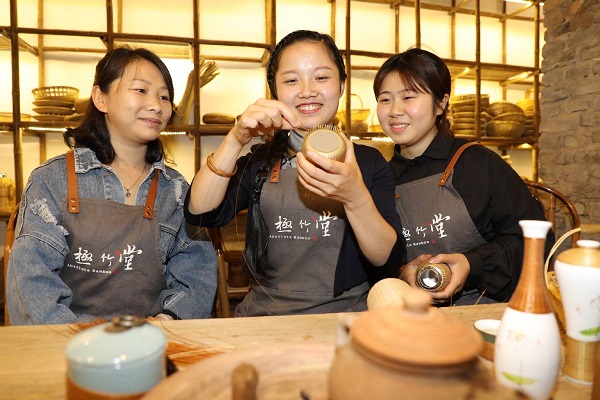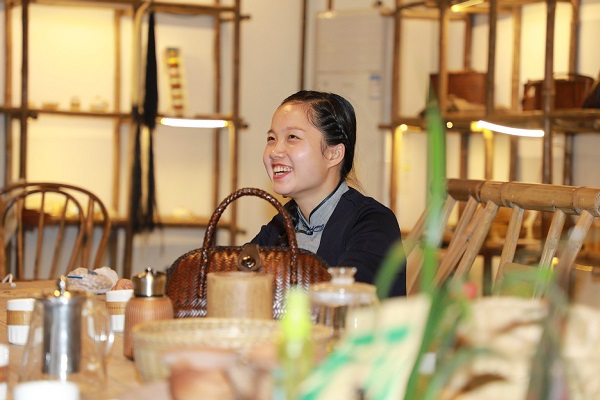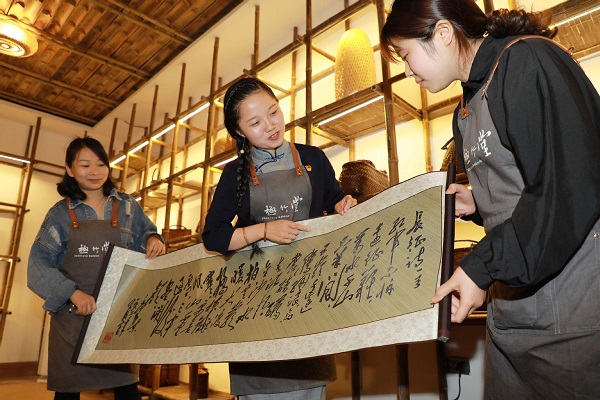NPC deputy: Spinning bamboo into gold


Yang Changqin, middle, teaches trainees techniques of bamboo weaving at the training center in Chishui, Southwest China's Guizhou province, in May 2020. [Photo by Wang Hong/provided to chinadaily.com.cn]
NPC deputy Yang Changqin, an inheritor of Chishui bamboo weaving, an intangible cultural heritage (ICH), proposes tapping distinctive local resources as a shot in the arm for rural vitalization.
What Yang, a member of the Miao ethnic group from Chishui, Southwest China's Guizhou province, has been doing over the past decade is exactly in line with her proposal.
Supported by the local government, Yang founded her bamboo weaving company in 2012 and named it "Hand in Hand" in the hopes she could hold more locals' hands, pull them out of poverty and help them get rich.
Founded with only four employees, the company now has more than 100 full-time employees, mostly "left-behind" women from poor households, Yang said.
Delicate and creative bamboo products including vessel covers, bags and paintings, are sold under the brand Absolute Bamboo through physical stores, expos and e-commerce platforms.
"Last year, our company's sales exceeded six million yuan ($843,063), two million ($281,021) more than that in 2018," Yang said, adding 60 percent of her company's products were sold overseas.

Yang Changqin sits by a table on which bamboo-weaving handicrafts are displyed, in Chishui, Southwest China's Guizhou province, in May 2020. [Photo by Wang Hong/provided to chinadaily.com.cn]
Aside from adding jobs and increasing her country fellows' incomes, the boom of Yang's company is further shared by the local community.
As her company was invested with the government's special poverty alleviation funds, 177 registered poor households can enjoy the company's dividends.
"So far nearly 120,000 yuan has been paid as dividends to our village," Yang told China Daily website on May 21.
Yang's success sets an example. Neighboring villages have also started developing their own bamboo-weaving industries.
In 2019, Yang transformed the premises of a relocated school into a production and training base in her hometown Datong township.
So far, more than two thousand people, young and old, from near and afar, have "graduated" from the center and acquired fundamental bamboo weaving techniques, Yang said.

Yang Changqin, middle, shows a bamboo-weaving painting at her workshop in Chishui, Southwest China's Guizhou province, in May 2020. [Photo by Wang Hong/provided to chinadaily.com.cn]
Chishui city has currently about 200,000 people engaged in bamboo planting, processing and tourism, nurturing an industrial chain underpinned by 88,553 hectares of bamboo groves, according to a report from Xinhua News Agency.
To keep the progress sustainable, the NPC deputy pointed out several more things need doing to strengthen the city's hard-earned poverty reduction results.
"For example, I've had a really hard time seeking marketing channels, taking our handicrafts on the road to various expos around the country for potential customers."
The inheritor also emphasized the significance of subsidizing inheritors.
"Acquiring the craft takes months, and becoming adept, years. To ease the financial burden of inheritors and keep them motivated, direct subsidies are indispensable."
Born in 1990, Yang was recognized as a provincial-level inheritor of Chishui bamboo weaving in 2015, making herself the youngest inheritor of this heritage.
MOST POPULAR
- 1 China to give visa-free treatment to another 9 countries
- 2 China fully opens manufacturing sector to foreign investors in landmark opening up move
- 3 China's import expo attracts record-breaking participating countries, exhibitors
- 4 China's door opening even wider to foreign visitors, businesses
- 5 China revises rules to ease foreign strategic investment in listed firms
Editors' Picks
 Video:
Peru sees new port open
Video:
Peru sees new port open
 Infographic:
China's public holidays for 2025
Infographic:
China's public holidays for 2025
 Infographic:
Basic facts of APEC
Infographic:
Basic facts of APEC
 Infographic:
Wrapping up the 7th CIIE: Data recap
Infographic:
Wrapping up the 7th CIIE: Data recap



